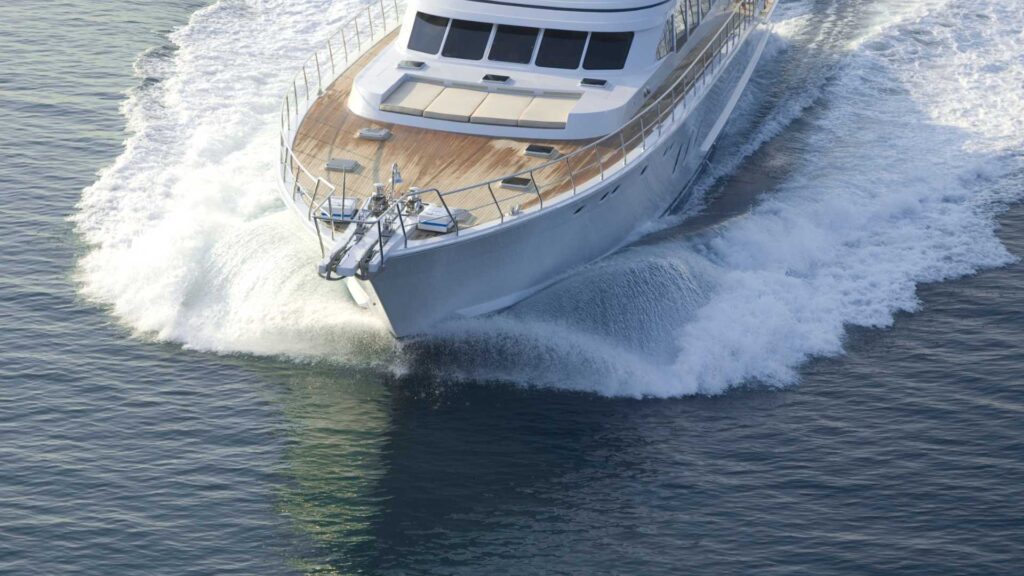Address
11,Cove Drive,
One 15 Marina Club,
Singapore 098497
Phone
+65 9155 4060
Electric yachts are a relatively new phenomenon in the boating world, but they are gaining more attention and popularity among boaters who are looking for a greener, quieter, and more cost-effective way to enjoy life at sea. However, electric yachts also come with some drawbacks and challenges that need to be considered before making the switch from traditional diesel or gasoline engines. In this article, we will explore the pros and cons of owning an electric yacht, and provide some tips and advice for those who are interested in this emerging technology.
An electric yacht is a boat that uses electric motors instead of internal combustion engines to propel itself through the water. Electric motors can be powered by batteries, solar panels, wind generators, or a combination of these sources. Some electric yachts also have a backup generator or a hybrid system that can use diesel or gasoline fuel when needed. Electric yachts can come in various shapes and sizes, from small dinghies and tenders to large catamarans and sailboats.
Electric yachts are becoming more popular for several reasons. First, they offer environmental benefits, as they reduce greenhouse gas emissions and pollution from burning fossil fuels. Second, they offer performance benefits, as they operate more quietly and smoothly than conventional engines, and have higher efficiency and lower maintenance requirements. Third, they offer economic benefits, as they have lower fuel and operating costs, and may qualify for tax incentives and subsidies in some countries. These advantages make electric yachts appealing to boaters who care about sustainability, comfort, and savings.
Let’s take a closer look at some of the pros of owning an electric yacht.
One of the main reasons why boaters choose electric yachts is because they want to reduce their environmental impact and contribute to the fight against climate change. Electric yachts offer several environmental benefits compared to conventional boats.
Electric yachts emit zero or very low levels of carbon dioxide (CO2), nitrogen oxides (NOx), sulfur oxides (SOx), particulate matter (PM), and other harmful substances that contribute to global warming and air pollution. According to an estimate from electricmotoryachts.com, if just 5% of the roughly 13 million registered boats in the United States today repowered with electric, boaters would eliminate an estimated 1 billion pounds of CO2 emissions. Scaled across boaters around the world, the potential for boaters to meaningfully reduce greenhouse gas emissions is significant.
Electric yachts also prevent oil or gas spills that can damage marine ecosystems and wildlife. Moreover, they do not produce noise pollution that can disturb marine animals and humans alike.
Electric yachts can use renewable energy sources such as solar panels, wind generators, or hydrofoils to generate electricity for their motors. These sources are clean, abundant, and free, unlike fossil fuels that are finite, expensive, and harmful. By using renewable energy sources, electric yachts can reduce their dependence on fossil fuels and increase their self-sufficiency.
Another reason why boaters choose electric yachts is because they want to improve their boating experience and performance. Electric yachts offer several performance benefits compared to conventional boats.
Electric yachts are much quieter than diesel or gasoline engines, as they do not have combustion noise or exhaust fumes. This creates a more relaxing environment on board, as well as a better communication with other boaters and marina staff. Electric yachts also have less vibration and heat, which enhances the comfort and safety of the passengers and crew.
Electric yachts have higher efficiency than diesel or gasoline engines, as they do not have idle speed or transmission losses. They also have more torque from the moment the shaft is engaged, which means they can accelerate faster and maneuver better than conventional engines. Electric yachts also have lower maintenance requirements, as they have fewer moving parts and fluids that need to be replaced or serviced. This saves time and money for the owners and operators of electric yachts.

A third reason why boaters choose electric yachts is because they want to save money and take advantage of incentives and subsidies. Electric yachts offer several economic benefits compared to conventional boats.
Electric yachts have lower fuel and operating costs than diesel or gasoline engines, as electricity is cheaper and more stable than fossil fuels. According to Sail Greener, electric motors can cost as little as $0.05 per nautical mile to run, compared to $0.50 for diesel engines. Electric yachts also have lower maintenance costs, as mentioned above, which reduces the overall cost of ownership.
Electric yachts may qualify for tax incentives and subsidies in some countries that aim to promote green transportation and reduce carbon emissions. For example, in Norway, electric boats are exempt from value-added tax (VAT) and registration fees, which can save up to 25% of the purchase price. In France, electric boats can receive a subsidy of up to 30% of the cost of the electric motor or battery. These incentives and subsidies can make electric yachts more affordable and attractive for boaters.
Despite the many pros of owning an electric yacht, there are also some cons that need to be considered before making the decision. Electric yachts face some technical and infrastructure challenges that limit their adoption and use.
Technical challenges
One of the main challenges that electric yachts face is the technical limitations of their batteries and motors. Electric yachts have some disadvantages compared to conventional boats in terms of range and speed.
Electric yachts have a limited range and speed compared to diesel or gasoline engines, as their batteries have a finite capacity and discharge rate. The range and speed of an electric yacht depend on several factors, such as the size and type of the battery, the power and efficiency of the motor, the weight and shape of the boat, the weather and sea conditions, and the sailing style of the skipper. Generally speaking, electric yachts can travel between 20 to 100 nautical miles at a cruising speed of 5 to 10 knots before they need to recharge their batteries. This may not be enough for long-distance cruising or racing, especially in areas where there are no charging stations available.
Electric yachts rely on batteries to store electricity for their motors. Batteries are heavy and bulky components that take up space and add weight to the boat. The weight and size of the battery affect the performance and stability of the boat, as well as the available room for passengers, crew, and equipment. Electric yachts need large batteries with high capacity to achieve a decent range and speed, but these batteries are also more expensive and difficult to install. Moreover, batteries degrade over time and lose their capacity, which means they need to be replaced or upgraded periodically.

Another challenge that electric yachts face is the lack of infrastructure support for their charging and servicing needs. Electric yachts have some disadvantages compared to conventional boats in terms of availability and cost of charging stations and service centers.
Electric yachts need charging stations to recharge their batteries when they run low on power. However, charging stations for electric boats are not widely available or accessible in many parts of the world, especially in remote or developing areas. This limits the cruising options and destinations for electric yacht owners, as they need to plan their routes carefully and avoid areas where there are no charging facilities. Moreover, charging stations may have different standards and compatibility issues with different types of batteries and connectors, which may cause inconvenience or safety risks for electric yacht owners.
Electric yachts also need service centers to repair or maintain their motors and batteries when they encounter problems or malfunctions. However, service centers for electric boats are not widely available or skilled in many parts of the world, especially in remote or developing areas. This means that electric yacht owners may have difficulty finding qualified technicians or spare parts for their boats when they need them. Moreover, service centers may charge higher fees or take longer time for electric boat repairs or maintenance than conventional boat repairs or maintenance.
Electric yachts have a higher initial purchase price than diesel or gasoline engines, as their motors and batteries are more expensive and complex to manufacture. According to [Boat International], electric yachts can cost up to 30% more than conventional yachts of the same size and specifications. Electric yachts also have a higher installation cost, as they require special wiring, connectors, inverters, chargers, and controllers to connect their motors and batteries to the boat’s electrical system. These components are not only costly, but also require professional installation and certification to ensure safety and compliance with regulations.
Electric yachts are an innovative and eco-friendly alternative to conventional boats that use diesel or gasoline engines. Electric yachts offer several pros, such as environmental benefits, performance benefits, and economic benefits, that make them attractive to boaters who care about sustainability, comfort, and savings. However, electric yachts also have some cons, such as technical challenges and infrastructure challenges, that limit their adoption and use. Electric yachts have some limitations in terms of range and speed, battery weight and capacity, availability, and cost of charging stations and service centers, and initial purchase price and installation cost.
Therefore, before buying or owning an electric yacht, boaters should weigh the pros and cons carefully and consider their needs and preferences. Electric yachts are best suited for boaters who do not need to travel long distances or at high speeds, who have access to charging facilities and service centers in their cruising areas, and who can afford the higher upfront cost and installation cost of electric motors and batteries, and who want to enjoy a greener, quieter, and more cost-effective boating experience.
If you are interested in buying or owning an electric yacht, you can Contact BASCO Boating, the most reliable and effective boating platform in Asia-Pacific. We can help you find the best electric yacht for your needs and budget. We also provide information and advice on how to operate and maintain your electric yacht safely and efficiently. BASCO Boating is your trusted partner in achieving your innermost dreams about life at sea.
Q: How long does it take to charge an electric yacht?
A: The charging time of an electric yacht depends on the size and type of the battery, the power and voltage of the charger, and the state of charge of the battery. Generally speaking, it can take anywhere from 2 to 12 hours to fully charge an electric yacht battery. However, some fast chargers can reduce the charging time to less than an hour.
Q: How long does an electric yacht battery last?
A: The lifespan of an electric yacht battery depends on the quality and type of the battery, the frequency and intensity of use, the charging and discharging cycles, the temperature and humidity conditions, and the storage and maintenance practices. Generally speaking, an electric yacht battery can last between 5 to 10 years before it needs to be replaced. However, some batteries can last longer or shorter depending on how they are used and cared for.
